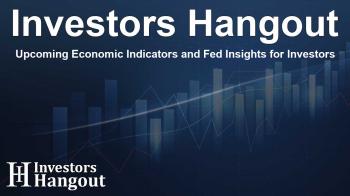Upcoming Economic Indicators and Fed Insights for Investors

Understanding the Economic Landscape Ahead
As we delve into the upcoming economic assessments, all eyes are on the Federal Reserve and its Chair, Jerome Powell. The Fed is about to gather at their annual retreat to discuss crucial economic signals that could shape monetary policy moving forward. The recent fluctuations in employment figures have given both pessimists and optimists room for interpretation, making this gathering even more pivotal.
Recent Economic Trends
In the weeks following significant job market surprises, we have seen mixed signals in economic performance. Recent data indicates a rise in core inflation, with inflation measures showing not just an increase, but also notable price pressures. The latest consumer price index (CPI) data revealed a year-on-year increase of 3.1%, while producer prices recorded their highest monthly gain in three years. As markets digest this information, anticipation is building for Powell's remarks at the end of the week.
Insights from Fed Leaders
In the lead-up to Powell's speech, two influential Fed officials, Michelle Bowman and Christopher Waller, will be discussing their views on monetary policy. They have previously advocated for easing measures and might attempt to voice their concerns about the current economic trajectory during this key event. Their stance highlights a significant debate within the Fed regarding the appropriate response to recent data.
Key Economic Data to Watch
The upcoming week will feature several economic indicators that could sway the opinions of Fed members during their discussions. Here’s a closer look at what to expect:
(1) Housing Starts
The housing market is a critical area of focus, particularly as high mortgage rates affect affordability. This week’s reports on housing starts are expected to point to a slight decrease, given the uncertainties and pressures that have built up in the market.
(2) Existing Home Sales
Selling existing homes is another significant metric to examine. Current trends suggest that sales may lag, reflecting ongoing challenges in price affordability. High prices combined with rising interest rates could discourage buyers, presenting a troubling outlook for this sector.
(3) Jobless Claims
Notably, the jobless claims data, which business analysts are closely monitoring, could reassure those worried about rising layoffs. Keeping claims steady around the previous week’s levels may alleviate concerns regarding a deteriorating labor market.
(4) Leading Economic Indicators
The Index of Leading Economic Indicators (LEI) will also be released, and traditionally, it signals impending economic changes. While it has had mixed signals in the past year, the correlation between the LEI and the stock market could offer valuable insights as we look ahead.
The Fed’s Path Forward
The data released in the following days will be critical in shaping the Fed's decisions moving into September. The ongoing tensions in labor numbers suggest a shift in hiring practices and economic resilience, leaving many to ponder the Fed’s next move amidst pressures from both inflation and growth concerns. Investors should remain alert to how fresh data might influence financial markets.
Frequently Asked Questions
What is the significance of the Fed's annual retreat?
The Fed's annual retreat serves as a crucial platform for discussing economic outlooks and formulating monetary policy strategies based on current economic data.
How do housing starts impact the economy?
Housing starts are a key indicator of economic health, influencing employment, investment, and overall consumer spending, thus impacting economic growth.
Why are jobless claims important indicators?
Jobless claims provide valuable insights into the labor market, helping to assess economic stability and predict future employment trends.
What are leading economic indicators?
Leading economic indicators are statistics that tend to predict future economic activity. They help businesses and policymakers gauge where the economy is headed.
How does inflation affect the Fed's policy decisions?
Inflation levels significantly influence the Fed's policy decisions, as it must balance the need for economic growth with the importance of maintaining price stability.
About The Author
Contact Owen Jenkins privately here. Or send an email with ATTN: Owen Jenkins as the subject to contact@investorshangout.com.
About Investors Hangout
Investors Hangout is a leading online stock forum for financial discussion and learning, offering a wide range of free tools and resources. It draws in traders of all levels, who exchange market knowledge, investigate trading tactics, and keep an eye on industry developments in real time. Featuring financial articles, stock message boards, quotes, charts, company profiles, and live news updates. Through cooperative learning and a wealth of informational resources, it helps users from novices creating their first portfolios to experts honing their techniques. Join Investors Hangout today: https://investorshangout.com/
The content of this article is based on factual, publicly available information and does not represent legal, financial, or investment advice. Investors Hangout does not offer financial advice, and the author is not a licensed financial advisor. Consult a qualified advisor before making any financial or investment decisions based on this article. This article should not be considered advice to purchase, sell, or hold any securities or other investments. If any of the material provided here is inaccurate, please contact us for corrections.

